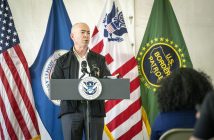The Washington Post recently featured an op-ed titled, “I Became an Asylum Officer to Help People. Now I Put Them Back in Harm’s Way.” It was written by Charles Tjersland, Jr., an Asylum Officer with U.S. Citizenship and Immigration Services (USCIS).
Mr. Tjersland claims that this is a “demoralizing time” for asylum officers, arguing that the Trump administration’s “Remain in Mexico” policy makes a “mockery” of their “mission.”
The problem is that he doesn’t know what his mission really is. To a casual observer, it appears that Mr. Tjersland sees himself as an advocate for foreign nationals and believes that his job is to let in as many asylum seekers as possible – even those fleeing crime and bad economies, rather than actual persecution. But that self-image doesn’t square with an asylum officer’s job description.
Asylum officers work for the United States. Like every other Executive Branch employee, their first responsibility is to the American public, not to foreign nationals. And it is profoundly distasteful when federal officers exploit their position as a platform for criticizing a sitting president’s policy choices.
Especially when they are flat out wrong. Mr. Tjersland implies that both U.S. immigration law and international human rights law require the U.S. to let asylum-seekers await the adjudication of their claims in the U.S. and that the Trump administration is violating both moral and legal obligations to aid the oppressed. But that isn’t even close to being true.
The U.S. is a signatory to the 1951 United Nations Convention Relating to the Status of Refugees, the legal instrument that defines both refugee status and political asylum. However, as the International Justice Resource Center notes, “The 1951 Convention does not define how States parties are to determine whether an individual meets the definition of a refugee. Instead, the establishment of asylum proceedings and refugee status determinations are left to each State party to develop.”
Consistent with its obligations under the 1951 Convention, the U.S. has provided a comprehensive framework for granting relief to the persecuted – and has taken in more refugees and asylees than all other nations combined.
But, in order to assure American sovereignty, Congress formulated asylum as a discretionary form of relief. As courts have consistently held from Matter of Salim in 1982, to the more recent Patpanathan decided in 2014, the U.S. government is not required to grant asylum to anyone, even people who are clearly subject to persecution in their home country. And the U.S. may decide whether or not to furnish protection based on its own public safety, national security and foreign affairs interests.
Like the 1951 Convention, domestic immigration law is also silent about how massive groups of asylum seekers are to be handled during the pendency of their applications.
However, 8 U.S.C. § 1182(f) states quite explicitly that, “Whenever the president finds that the entry of any aliens, or of any class of aliens, into the United States would be detrimental to the interests of the United States…[he]may impose on the entry of aliens any restrictions he may deem to be appropriate.” That clearly encompasses a requirement that Central American asylum seekers await the adjudication of their applications in Mexico.
So what is Mr. Tjersland really complaining about? He doesn’t like his boss, Donald Trump. But like every other federal employee who dislikes the results of the latest presidential election, Mr. Tjersland has two choices: Do what he’s paid to do or leave government service.
But he has no business misleading the public in order to create the false impression that his boss is ordering him to disobey the law. Americans deserve more from the people they employ to make our government run.





1 Comment
Pingback: Asylum Officers, Do What America Pays You to Do – The Importance of Business